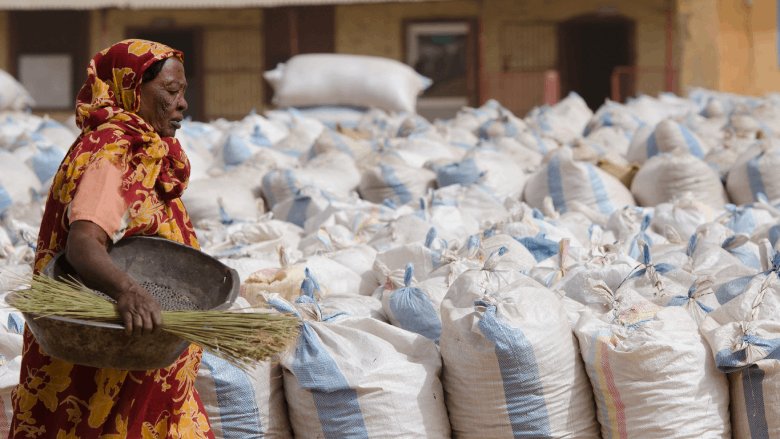In 2022, conflict, economic shocks, natural disasters, soaring fertilizer and food prices combined to create a global food and nutrition security crisis of unprecedented proportions, with the poorest bearing the greatest costs. In 2023, all signs point to even further deteriorations in both acute and chronic levels. According to the , the number of people in crisis or worse (IPC/CH Phase 3 or above) or equivalent �C that is the number of people requiring urgent humanitarian assistance �C is forecast to reach up to 205 million in 45 countries/territories included in the report. Urgent action is necessary to safeguard lives and livelihoods and prevent the reversal of hard-earned development gains. When such crises occur, time is of the essence. The longer it takes to mobilize a response, the more severe a crisis becomes. Vulnerabilities heighten and become protracted, eroding resilience to weather future shocks. Crisis preparedness �C the knowledge and capacities to effectively anticipate, respond to, and recover from the impacts of major shocks �C is therefore critical.
To promote greater preparedness to major food and nutrition security crises, the World Bank as part of the (GAFS) �C in close collaboration with the Global Network Against Food Crises (GNAFC), the Food and Agriculture Organization (FAO) of the United Nations (UN), the UN Office for the Coordination of Humanitarian Affairs (OCHA), the UN Children's Fund (UNICEF), the United Nations Development Programme (UNDP), the World Food Program (WFP), and the UN Famine Prevention and Response Coordinator �C is supporting countries as they develop and operationalize . The FSCPP is a national operational plan that defines what constitutes a major food and nutrition security crisis for a country. The plan explains how crisis risks are actively monitored and identified and details step-by-step protocols, roles, and timelines for mobilizing additional funding and scaled up early action.
Each national FSCPP brings together fragmented crisis preparedness elements into a cohesive operational framework to support the systematic recognition of an emerging crisis. Once a crisis is recognized, FSCPPs will prompt timely, joined-up early action across government, humanitarian, and development partners to prevent and mitigate the impacts of the crisis. Actions build on the strengths of the 60+ multilateral and bilateral humanitarian and development partners of GAFS and the , as well as the GNAFC. The FSCPP is guided by seven key principles.
1. Government owned and led
Where possible, the government will be at the center of developing and managing the FSCPP across all relevant national and local institutions and agencies. In contexts in which a government may have limited operational capacity, these functions will be supported by the international community �C with responsibilities shared across humanitarian and development partners �C until the government��s capacity is built.
2. Focused on major food and nutrition security crises
In any given year, a country may face numerous shocks affecting food and nutrition security, some of which may have localized and limited impacts while others can lead to widespread and severe consequences across the country. The FSCPP is focused on these latter shocks which extend beyond and exacerbate existing chronic issues and threaten to lead to major food and nutrition security crises. In the event of such major shocks, it is critical for responses to be mobilized across all support channels, including government, humanitarian, and development partners.
3. Evidence-based
The FSCPP will be anchored by rigorous, well vetted, and timely food and nutrition security information and data from a wide variety of sources to provide a comprehensive view of emerging and major risks.
4. Pre-arranged, operations, and timely
The FSCPP moves beyond just risk monitoring activities and requires that three interlinked operational elements be in place. This includes operational arrangements and protocols for:
- quickly identifying and continuously monitoring major food and nutrition security crises;
- convening programmatic leads across government, humanitarian, and development partners in one space to assess emerging risks and scale up early action as needed; and
- convening senior officials to collectively recognize a major crisis, bridge operational and funding gaps, and promote well-coordinated and holistic responses across government and its food and nutrition security partners.
5. Holistic
If a major crisis is identified, activities should be scaled up quickly and coordinated across the fullness of government, humanitarian, and development partners, utilizing the comparative advantages of all partners to save lives, protect livelihoods, and build resilience to future shocks.
6. Do no harm
The FCSPP should carefully take into consideration country and local contexts and account for how responses may interact with and affect existing economic, political, and social dynamics, especially for the most vulnerable.
7. A living document
Crisis preparedness is a continuous activity requiring steadfast maintenance and investment so that operational arrangements are up to date and can be activated quickly. The FSCPP, therefore, serves as a living document that should be revisited and updated regularly to ensure it remains fit for purpose.
An early glimpse of FSCPP collaborations at the country-level: Somalia Acute food insecurity in Somalia has been dire and protracted. As of December 2022, were estimated to be in crisis, and an additional 3 million people were estimated to be in stressed conditions. In response to worsening circumstances, the Government of Somalia �C in collaboration with the World Bank as part of the GAFS and in close collaboration with the GNAFC, FAO, OCHA, UNICEF, WFP, and the UN Famine Prevention and Response Coordinator �C is developing its national FSCPP. In January 2023, following several months of bilateral consultations, the Federal Government of Somalia (FGOS) held a technical consultation workshop to review the working draft of the plan, help refine its proposed arrangements, and build consensus on next steps and the timeline for its operationalization. Follow up consultations will be held over the coming months to further refine and detail the plan��s operational arrangements. The plan is expected to be completed in September 2023, following formal endorsement by the FGOS and other food and nutrition security partners leading programmatic responses in the country. |
Expert Video Series
- Lavinia Antonaci, Technical Coordinator of the Global Network Against Food Crises
- Tsedeye Girma, Chief Risk Analysis and Preparedness | UNICEF
- Alexandra Horst, World Bank Senior Economist and GAFS Secretariat
- Ronald Jackson, Head of the Disaster Risk Reduction, Recovery for Building Resilience | UNDP
- Kyriacos Koupparis, Head of the Hunger Monitoring Unit | UNWFP
- Julian Lampietti, World Bank Manager, Global Agriculture Practice
- Hugh MacLeman, Head of Country Engagement for the Global Network Against Food Crises | United Nations World Food Programme
- Sara McHattie, Global Coordinator of the Food Security Information Network
- Dr. David Nabarro, Strategic Director of 4SD Foundation and Co-lead of the United Nations Global Crisis Response Group
- Luca Russo, Team Leader in Office of Emergency and Resilience | Food and Agriculture Organization
Developing & Operationalizing the FSCPP
The specific development processes will be different in each country based on their respective capacities, needs, and priorities. In contexts with well-established food and nutrition security crisis response systems, FSCPPs provide an opportunity to review these systems and further strengthen their crisis preparedness elements. In contexts where existing systems may only partially cover crisis preparedness elements, the FSCPP provides an important means for identifying critical gaps and setting the stage for filling these gaps over time, including by building government capacity and ownership over time. Government preparations are underway and technical workshops will be organized in 26 countries with the aim of a majority of plans being initially drafted by the end of 2023.
Many countries across the globe will continue facing the threat of food crises. While this latest global crisis is exceptional in terms of scale, it is only the latest tipping point for a food system already on the edge. Against this backdrop, crisis preparedness has never been more important. The FSCPP is a key tool to help countries recognize the signs of an emerging food and nutrition security crisis and effectively leverage the contributions of all partners to respond. These efforts will also complement much needed and scaled-up longer-term investments to address their root causes and help break the vulnerability cycle of repeat crises.
For more information on the FSCPP, including contact information for the World Bank��s country-level focal points supporting these efforts, .

